
Robert Franklin Stroud, known as the "Birdman of Alcatraz", was a convicted murderer, American federal prisoner, and author who has been cited as one of the most notorious criminals in the United States. During his time at Leavenworth Penitentiary, he reared and sold birds and became a respected ornithologist. From 1942 to 1959, he was incarcerated at Alcatraz, where regulations did not allow him to keep birds. Stroud was never released from the federal prison system; he was imprisoned from 1909 to his death in 1963.

I Want to Live! is a 1958 American independent biographical film noir drama film directed by Robert Wise, and starring Susan Hayward, Simon Oakland, Virginia Vincent, and Theodore Bikel. It follows the life of Barbara Graham, a prostitute and habitual criminal, who is convicted of murder and faces capital punishment. The screenplay, written by Nelson Gidding and Don Mankiewicz, was adapted from personal letters written by Graham, in addition to newspaper articles written by Pulitzer Prize-winning journalist Ed Montgomery in the San Francisco Examiner. The film presents a highly fictionalized version of the case, indicating the possibility that Graham may have been innocent.
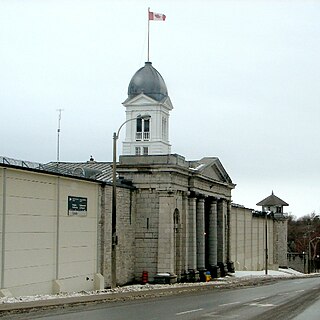
Kingston Penitentiary is a former maximum security prison located in Kingston, Ontario, Canada, between King Street West and Lake Ontario.

James Joseph "Whitey" Bulger Jr. was an American organized crime boss who led the Winter Hill Gang, an Irish Mob group in the Winter Hill neighborhood of Somerville, Massachusetts, a city directly northwest of Boston. On December 23, 1994, Bulger fled the Boston area and went into hiding after his former FBI handler, John Connolly, tipped him off about a pending RICO indictment against him. Bulger remained at large for sixteen years. After his 2011 arrest, federal prosecutors tried Bulger for nineteen murders based on grand jury testimony from Kevin Weeks and other former criminal associates.

Robert Harriot Barrat was an American stage, motion picture, and television character actor.

Howard Close Hickman was an American actor, director and writer. He was an accomplished stage leading man, who entered films through the auspices of producer Thomas H. Ince.
John Joseph Connolly Jr. is an American former FBI agent who was convicted of racketeering, obstruction of justice and murder charges stemming from his relationship with Boston mobsters James "Whitey" Bulger, Steve Flemmi and the Winter Hill Gang.

Up the River is a 1930 American pre-Code comedy film directed by John Ford, and starring Claire Luce, Spencer Tracy and Humphrey Bogart. The plot concerns escaped convicts, as well as a female convict. It was the feature film debut role of both Tracy and Bogart. Despite Bogart being billed fourth, Tracy's and Bogart's roles were almost equally large, and this is the only film in which they appeared together. Up the River is also Bogart's only film directed by John Ford. Bogart's image is featured with Luce on some of the film's posters rather than Tracy's since Bogart was the romantic lead with Luce. Fox remade the film in 1938 starring Preston Foster and Tony Martin playing their roles.

Convicted is a 1950 American crime film noir directed by Henry Levin and starring Glenn Ford and Broderick Crawford. It was the third Columbia Pictures film adaptation of the 1929 stage play The Criminal Code by Martin Flavin, following Howard Hawks's The Criminal Code (1931) and John Brahm's Penitentiary (1938).
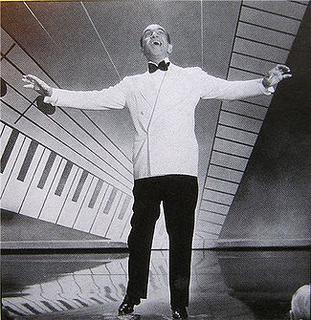
Wonder Bar is a 1934 American pre-Code film adaptation of a Broadway musical of the same name directed by Lloyd Bacon with musical numbers created by Busby Berkeley.

James William Flavin Jr. was an American character actor whose stage, film, and television career lasted some forty years.
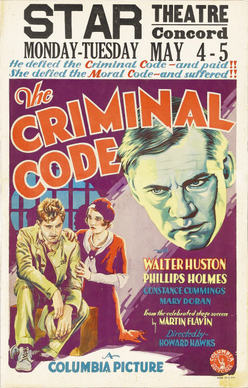
The Criminal Code is a 1931 American pre-Code romantic crime drama film directed by Howard Hawks and starring Walter Huston and Phillips Holmes. The screenplay, based on a 1929 play of the same name by Martin Flavin, was written by Fred Niblo Jr. and Seton I. Miller, who were nominated for Best Adaptation at the 4th Academy Awards but the award went to Howard Estabrook for Cimarron.

Charlie Chan in Honolulu is a 1939 American mystery film directed by H. Bruce Humberstone, starring Sidney Toler as the fictional Chinese-American detective Charlie Chan. The film is the first appearance of both Toler as Chan and Victor Sen Yung as "number two son" Jimmy.

State Penitentiary is a 1950 American drama film directed by Lew Landers and starring Warner Baxter and Onslow Stevens. The film's prison scenes were photographed at the state penitentiary at Carson City, Nevada.

Experiment Alcatraz is a 1950 American crime film directed by Edward L. Cahn and written by Orville H. Hampton. The film stars John Howard, Joan Dixon, Walter Kingsford and Robert Shayne. The film was released on November 21, 1950, by RKO Pictures.

The Amazing Mr. Williams is a 1939 American screwball comedy film produced by Everett Riskin for Columbia Pictures and directed by Alexander Hall. The film stars Melvyn Douglas, Joan Blondell and Clarence Kolb. It was written by Dwight Taylor, Sy Bartlett and Richard Maibaum. The film is about a police lieutenant who is too busy solving crimes to marry his longtime fiancée, who decides to take action and get him to marry her and settle down. The film was released on November 22, 1939.

Doin' Time is a 1985 American comedy film directed by George Mendeluk and written by Franelle Silver, Ron Zwang and Dee Caruso. The film stars Jeff Altman, Dey Young, Richard Mulligan, John Vernon, Jimmie Walker, and Judy Landers. The film was released by Warner Bros. on May 19, 1985.
One Way Ticket is a 1935 American crime film directed by Herbert Biberman starring Lloyd Nolan, Peggy Conklin and Walter Connolly. The film is based on the 1934 novel One-Way Ticket by Ethel Turner.
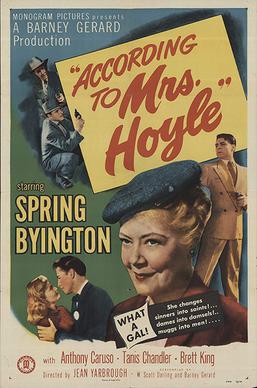
According to Mrs. Hoyle is a 1951 American crime film directed by Jean Yarbrough and written by Scott Darling and Barney Gerard. The film stars Spring Byington, Anthony Caruso, Tanis Chandler, Brett King, Stephen Chase and Robert Karnes. The film was released on May 20, 1951, by Monogram Pictures.
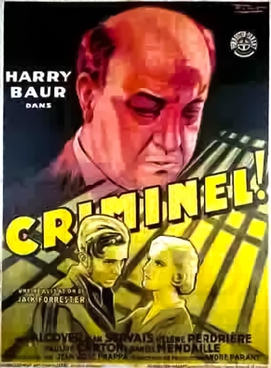
Criminal is a 1933 French drama film directed by Jack Forrester and starring Harry Baur, Pierre Alcover and Jean Servais. It is a remake of the 1930 America film The Criminal Code by Howard Hawks, itself based on a 1929 play of the same title by Martin Flavin.


















